We have our first guest on the Threadings. podcast!! <3
Hello!!! Happy Sunday. I am moving so slow that my breath rumbles with the earth shifting below me. I come to you from my patio. I am at peace. This day I would like to discuss this phrase that has been turning in my mouth like an unpopped grape:
my most favorite form of self-love is archival.
The person that gave me that delectable musing is here on this very podcast today!!
, the host of With Love and Butter, tells me stories about her life and I return in kind. It’s very intimate and vulnerable and lovely.Watch With Love and Butter here. Do it it’s so good.
In this episode we discuss: what does self-archival mean to you and for you? How did growing up on stage change what we need from and how we best love ourselves? What parts of us do we keep hidden? Why? How best do you love your community when your community expects you at the front of the room?
Of course, with lots of giggling, secret sharing, and stories about bullshit men I had to edit out in post. But you can absolutely tell when we are up to no good.
An excerpt from our conversation is here below, however you can request the full excerpt by emailing me at ismatu.gwendolyn@gmail.com. [it is far too long to fit into this email lol.] I’m going to be soaking in this conversation for an eon at minimum. Enjoy enjoy enjoy.
I hope the work of your day passes through your hands with ease. <3
ismatu g.
Podcast Transcript
ismatu gwendolyn: Courtney, it is so good to see you.
Courtnee Futch: Hi, my love. Oh, this warms my heart so much. Thank you so much for having me.
ismatu gwendolyn: Thank you for being here! No one can see me but I'm beaming. I feel like you can hear the smile through my voice. I'm here with tea. I, uh, of course am drinking green tea because apparently I'm a grown bitch now who no longer is interested in staining my teeth. So, uh, it's a lemongrass Japanese vanilla blend. I'm living my best life. How are you?
Courtnee Futch: I’m doing so well. You know I am actually without tea today; I was feeling a little jittery this morning so it's just water for me as I try to bring myself back down into the body.
ismatu gwendolyn: It makes so much sense. Beautiful. I have to credit you with changing my life by just one turn of phrase, which you do often. Like, I mean, I don't know if the– I'm certain that the people that listen to my podcast and the people that listen to yours is more of a circle than a Venn diagram. I regularly interact with the best parts of the internet, and I feel like you do too from your comment section. But if you don't already know Courtney Futch: chef extraordinaire... brilliantly beautiful black woman, host of With Love and Butter Podcast. Like I really cannot recommend it more. It's so good. It's so good.
Courtnee Futch: Thank you!
ismatu gwendolyn: You regularly change my life with your words. And one of the things that you said, actually not on a podcast on just a call between us was, “One of my most favorite forms of self-love is archival.” I have literally dedicated an entire series on my podcast to just that phrase because there's so much for me there. But will you tell me a little bit more about what you mean when you say that?
Courtnee Futch: Yeah, so I think that something that I really struggled with was always feeling like my experience was a very lonely one– in that I'm (1) an only child of divorced parents, right? And so I have moved through a lot of the world, even in like my school spaces, as either the person that everybody went to in order to, kind of get their problem solved, or the student who was, you know, kind of alone in a more of like an adultified... sort of interaction with most of the adults in my life. So with my parents, I felt like I was having like, these very kind of adult conversations with them because the requirement was one such that I needed to be able to talk to them kind of at that level just for us to be able to be in like, stasis. And then that seeped over into my other relationships in my life. And I felt like what ended up happening (and we will end up getting into this some more) is that I ended up forgetting a lot of my childhood. And I think in part because I felt forgotten in my childhood as well. And so like, they're like very minimal photos. Any photos that I have actually in my childhood are ones that other family members took of me. Like, they’re other people’s parents. And I am in those photos but they're not the ones that my parents took. They're not the ones that, you know, like the people closest to me– like I, I think that there was just not really, um, there was not room for archival when the goal was survival. right?
ismatu gwendolyn: Oh. Yes.
Courtnee Futch: I think that's really what it is. And so on the flip side of having survived, I looked back and said, I don't have any memories of a young Courtney. I've got maybe 10 to 12 photos that kind of show me going through the world doing things, and if it wasn't an activity… I just don't know who I was. Like, I asked my parents to describe a young me and you know, and they describe the things that made it easier for them to exist in space with a child, right? Things about my, you know, the things that made me a great student or the things that made me an emotionally regulated child, right? But not really ever anything about like, “you were so much fun” or “you had, you know, X, Y, Z personality. I feel like nobody can recall to me who I was during those years, except for the time that I was in service to the needs that they had or to the ease that they required.
ismatu gwendolyn: wow.
Courtnee Futch: And so my love language back to myself now has had to become one in which I remember me. Because I felt like when the opportunity had been given– even when I made the request to people– they just kind of opted out.
ismatu gwendolyn: Wow.
Courtnee Futch: I think this is going to be a tearful episode, my love.
ismatu gwendolyn: It might be!
Courtnee Futch: We might be unearthing.
ismatu gwendolyn: I mean, you... I didn't realize how much of how much of my obsession with archival is related to not really being kept well in childhood. But yeah, you're right. Like, I had a really similar childhood experience. I think the the main difference between you and me is that I have a sister. I have an older sister. And I don't think that I would remember half of what I do about my childhood if she had not been there to confirm that... uh, things did happen that way. You know, I just watched the Hunger Games series because it went viral on Twitter. I'm pretty sure they marketed this to us like everybody go! Yeah but I um, marathoned them with a friend watching it now as a grown ass therapist. It's really really interesting to see how they navigate trauma and PTSD in regards to war (because those are movies about war). Um and there's a point in time, spoilers for the Hunger Games, but like please get your life,
Courtnee Futch: Right, come on, it's been a decade.
ismatu gwendolyn: yeah, right? Peta is being rehabilitated into his familial group after being kidnapped by the enemy and enduring torture. And he's going through his memories based on what they told him happened, what actually happened in a game that they play called Real or Not Real. And that literally brought tears to my eyes because I remember playing this game with my sister growing up. We grew up in a very tumultuous, abusive environment. There was a lot of change happening around us. There were a lot of adults that were sometimes trustworthy and sometimes weren't. And the amount of making sense that your brain does after the fact can sometimes be faulty. So I feel like I call her like every other week or so and be like, “...did that actually happen?” And she's like, bitch yes, that actually happened. Like, it was a life where things turned over again and again and again. Where the big picture stays the same– because when you grow up in the mountains, not a lot changes. The mountains are very stagnant creatures, slow to like and slow to love. It's just not a whole lot going on. And then my microspace was constantly volatile, especially with my parents immigrating to the United States, learning about Blackness as American, and then also international Blackness, coming into those identities in homogeneously white spaces, not even... mostly white– as in I was the only black person in my school other than my sister white. It was a place where people valued me because of how much I could output, because of my like, the amount of work that I could process even as a small child was like alarming to people.
Courtnee Futch: Mm-hmm.
ismatu gwendolyn: The amount that you have to get done is like, everyone always complimented me on my excellence but it's like, I have to survive. Like, this is what I have to do to make it out of here.
Courtnee Futch: Mm-hmm.
ismatu gwendolyn: Like, I mean, I appreciate how useful you all find me. It's just that I wish that I did not have to be this way.
Courtnee Futch: Yeah.
ismatu gwendolyn: And I would not, honestly, about childhood childhood, I don't remember a lot, but I did like writing. So I appreciate the fact that little me felt wildly enough about her life and liked her life enough to be able to write some of it down. And I didn't start writing writing. until I was 13 turning 14 and I remember the day very clearly where I was sitting in like a Colorado wood essentially. I was an outside child. I spent a lot of time outside. Don't nobody talk to a Black girl that is in trees by the way.
Courtnee Futch: LOL
ismatu gwendolyn: It was a very easy place for me to just hide. Oh yeah, that's Ismatu. She's weird. She's reading up a tree somewhere. I remember distinctly being among the trees and being like, I should find a notebook. I should write this down what I'm feeling. I don't know that I had the words for it then, but what I felt was... an intense connection to the land around me that saw a lot and remained unchanged. And I was like, “I too want to see a lot and remain unchanged because right now I belong to everybody else but me. And everybody else is not very good at keeping me.” It was the first time that I ever considered myself someone or something worth keeping, worth archiving. And I did not realize how deep it was for me. Like the getting to... to journaling and to picture taking and to decidedly remembering my day, my week, my month, my life.
Courtnee Futch: Hmm.
ismatu gwendolyn: Until you put it in context of, yeah I did this because my parents weren't very good at keeping me. They needed me to be a miniature adult as fast as possible.
Courtnee Futch: Mm-hmm.
ismatu gwendolyn: Same.
Courtnee Futch: Mm-hmm.
ismatu gwendolyn: Same. There was a lot of precious time, a lot of temporariness that is gone.That I don't ever get back.
Courtnee Futch: Yeah. And you know what I think is also really interesting is you talked about survival, right? But I think in addition to that, there is this piece about praise. Like, children are very quick with self-conditioning. And so the thing that I think I learned very early is that... I would continue to feed the things that people praised in me the most, right?
ismatu gwendolyn: real.
Courtnee Futch: And so it was very funny actually because like I also did a lot of public speaking as a kid and like, you know what I mean, young spelling bee champ and all of the things.
ismatu gwendolyn: SAME! No, that's wild— so what grade did you win the spelling to bee?
Courtnee Futch: Um, up through seventh.
ismatu gwendolyn: through seventh?
Courtnee Futch: Every year through seventh grade, yeah.
ismatu gwendolyn: come on!
Courtnee Futch: Yeah! Yeah. And then we finally stopped participating in the eighth grade. And I was like, what a bummer. I was really looking forward to beating your ass. You know what I mean? Um, but I felt like there were, while it was so funny, like while there were so many spaces, I think dedicated to, um, the act of performance for me. like public speech and all of these things. Like I decidedly like Did Not Dance. I sing also a little bit, but I decidedly like Did Not Dance when I was like in my younger school performance years, but I would always end up like, in oration. It was always like the Martin Luther King speech. It was always like, you know, Ego Tripping by Nikki Giovanni. There was always A Thing. And because I'd gotten praise for that so much, but. was also…? and this is going to be like this is the most interesting thing— I felt like I did not like my voice for years.


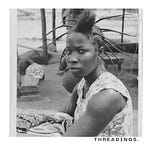


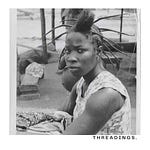

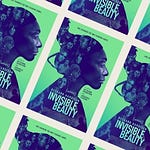


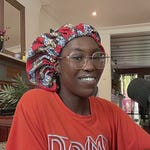
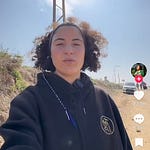
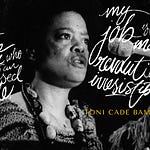
26 | Swapping Secrets with Courtnee Futch: what do you save for yourself when no one keeps you but The Stage?